 The Wing family of Cape Cod has had a great amount of genealogical information published about it over the years. Beginning with Rev. Conway P. Wing’s A Historical and Genealogical Register of John Wing, of Sandwich, Mass. And his Descendants, 1632-1888, the list includes Mary Elizabeth Sinnott’s Annals of the Sinnott, Rogers, Coffin, Corlies, Reeves, Bodine and Allied Families, published in 1905, in which Wing is one of the allied families; The Owl, a serial publication of the Wing Family Association from 1901 to the present, and most recently Raymond T. Wing’s 2006 version, Wing Genealogy, Volume 1, The Reverend John Wing of Banbury, Oxfordshire, England and his wife Deborah Bachiler, Their Ancestry and Descendants through Five Generations. Continue reading The Wings of a dilemma
The Wing family of Cape Cod has had a great amount of genealogical information published about it over the years. Beginning with Rev. Conway P. Wing’s A Historical and Genealogical Register of John Wing, of Sandwich, Mass. And his Descendants, 1632-1888, the list includes Mary Elizabeth Sinnott’s Annals of the Sinnott, Rogers, Coffin, Corlies, Reeves, Bodine and Allied Families, published in 1905, in which Wing is one of the allied families; The Owl, a serial publication of the Wing Family Association from 1901 to the present, and most recently Raymond T. Wing’s 2006 version, Wing Genealogy, Volume 1, The Reverend John Wing of Banbury, Oxfordshire, England and his wife Deborah Bachiler, Their Ancestry and Descendants through Five Generations. Continue reading The Wings of a dilemma
Category Archives: Research Methods
The year in review concluded
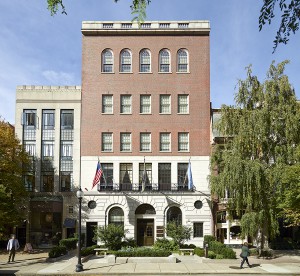 In yesterday’s post, I covered some of the more than 250 blog posts published in Vita Brevis during the first half of 2014. The series concludes with a post from each of the last six months of the year.
In yesterday’s post, I covered some of the more than 250 blog posts published in Vita Brevis during the first half of 2014. The series concludes with a post from each of the last six months of the year.
At the end of July, Katrina Fahy solved a genealogical puzzle using family letters, since the family in question lived in a region with few available nineteenth century vital records: Continue reading The year in review concluded
The year in review
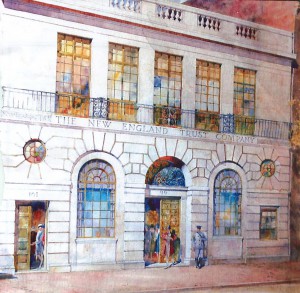
As I write this, a few days before the New Year begins, Vita Brevis is nearly a year old; it has had more than 300,000 page views since its first post on 2 January 2014. (This is a statistic I like to trumpet, although of course a single reader on a given day might well look at more than one entry: so I cannot claim 300,000 unique readers over the course of the first year, much as I would like to!) That first post, Generatio longa, vita brevis, hinted at the blog’s purpose: “Vita Brevis will include short posts on research methods – applicable to a variety of genealogical subjects – as well as posts on results. Like a mosaic, these posts will, in time, form a new collection for the genealogical researcher to explore.” Continue reading The year in review
The family historian
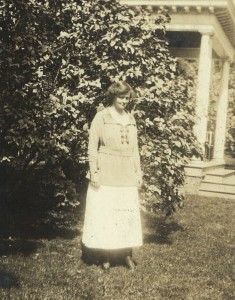
Most families have one: the family historian. Whether or not the focus is genealogical, there is usually at least one family member who keeps track of siblings and cousins, sometimes to the nth degree. My father’s family had one in my great-aunt Margaret Steward (1888–1975). I do not remember meeting her, but I’ve been told I take after her, at least in so far as the mantle of family genealogist passed from her to me when I was still in middle school. Continue reading The family historian
Town and city annual reports
 Municipal annual reports provide a breakdown of various city and town department budgets and expenditures for the year. At first glance it may seem that these publications would not be useful for genealogical research, but taking the time to search these reports for information about your ancestors may lead to some interesting discoveries about their lives and the lives of their contemporaries. Many of these reports include a roster of municipal employees and their annual salaries. For example, the 1887 edition of City of Somerville (Massachusetts) Annual Reports contains information submitted by a number of departments, including the School Committee.[1] Their report includes a table listing the school teachers who worked in Somerville that year, their salaries, and the year they were hired. Continue reading Town and city annual reports
Municipal annual reports provide a breakdown of various city and town department budgets and expenditures for the year. At first glance it may seem that these publications would not be useful for genealogical research, but taking the time to search these reports for information about your ancestors may lead to some interesting discoveries about their lives and the lives of their contemporaries. Many of these reports include a roster of municipal employees and their annual salaries. For example, the 1887 edition of City of Somerville (Massachusetts) Annual Reports contains information submitted by a number of departments, including the School Committee.[1] Their report includes a table listing the school teachers who worked in Somerville that year, their salaries, and the year they were hired. Continue reading Town and city annual reports
Moving to (and through) New York
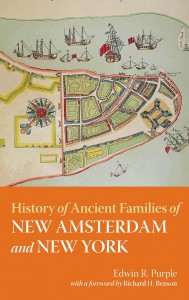 Building on previous posts, which featured books that help with researching ancestors who arrived first in Massachusetts and then moved westward or northward, this entry will look at some resources available to researchers whose ancestors moved to or first arrived in New York. As Henry B. Hoff, Editor of The New England Historical and Genealogical Register, notes in his introduction to the AmericanAncestors.org Research Guide on New York, “Finding information about your New York ancestors can be tricky. The difficulty depends on time, place, and group. Researching Dutch-descended New Yorkers in the Hudson Valley during the eighteenth century is likely to be easy; whereas researching settlers from New England in the same locale may be difficult. And of course the 1911 fire at the State Library in Albany and the fact that statewide registration of vital records did not start until 1880 only adds to the difficulty.” Continue reading Moving to (and through) New York
Building on previous posts, which featured books that help with researching ancestors who arrived first in Massachusetts and then moved westward or northward, this entry will look at some resources available to researchers whose ancestors moved to or first arrived in New York. As Henry B. Hoff, Editor of The New England Historical and Genealogical Register, notes in his introduction to the AmericanAncestors.org Research Guide on New York, “Finding information about your New York ancestors can be tricky. The difficulty depends on time, place, and group. Researching Dutch-descended New Yorkers in the Hudson Valley during the eighteenth century is likely to be easy; whereas researching settlers from New England in the same locale may be difficult. And of course the 1911 fire at the State Library in Albany and the fact that statewide registration of vital records did not start until 1880 only adds to the difficulty.” Continue reading Moving to (and through) New York
A Christmas box
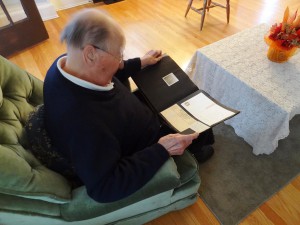
In this season of giving, sometimes the most enjoyment comes from sharing items you forgot you had instead of those newly received. Three years ago, I celebrated Christmas at the mountain home of my paternal grandparents. At some point, my grandfather mentioned to my father and aunts that he still had a box of their old vinyl records in storage. Naturally, they could not recall what might have been left over from their school days, and my cousins and I were curious about our parents’ musical tastes. We convinced my grandfather to dig out the box. Continue reading A Christmas box
Reading other people’s mail: Part Two
 Thomas Hutchinson (1711–1780) was the last crown-appointed civilian governor of Massachusetts. During his term of office, he dealt with the aftermath of both the Boston Massacre and the Boston Tea Party. The Colonial Society of Massachusetts has recently published the first volume of his selected correspondence covering the years 1740–1766. It is most readily available through amazon.com. Here are further thoughts about the process of documentary editing by John Tyler, one of the volumes’ two co-editors.
Thomas Hutchinson (1711–1780) was the last crown-appointed civilian governor of Massachusetts. During his term of office, he dealt with the aftermath of both the Boston Massacre and the Boston Tea Party. The Colonial Society of Massachusetts has recently published the first volume of his selected correspondence covering the years 1740–1766. It is most readily available through amazon.com. Here are further thoughts about the process of documentary editing by John Tyler, one of the volumes’ two co-editors.
It is often said that transcription (translating eighteenth-century handwriting into Microsoft Word) is about one-third of the work involved in documentary editing. For the Hutchinson papers, Malcolm Freiberg and Catherine Shaw Mayo had already established, in a preliminary way, the text of most key letters. Elizabeth Dubrulle and I would be negligent, however, if we did not check these against the originals, but Freiberg was very rarely wrong. Continue reading Reading other people’s mail: Part Two
Town historians: a helpful resource
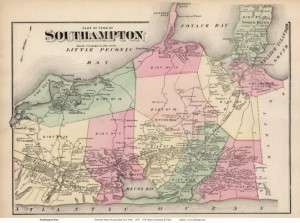
Recently, I was searching for records in the towns of Southampton, Easthampton, and Bridgehampton, all in Suffolk County, New York. I was trying to determine the identity of the father of Abraham C., who was born in 1720 in Southampton and died about 1785. The client had done some excellent research, and through his efforts, concluded that there were two possible outcomes. Since finding direct evidence from records for New York during this time period can be tricky, I examined numerous publications from our NEHGS collection, including town histories, such as the multi-volume series Records of The Town of Southampton, With Other Ancient Documents of Historic Value; published genealogies; and the excellent New York Genealogical and Biographical Record. Continue reading Town historians: a helpful resource
Jump starting your genealogical research
 This post marks the 250th blog post at Vita Brevis. To mark the occasion, I have asked some of our peerless contributors for suggestions on the theme of “jump starting“ genealogical research (and publication) for the holidays – with an eye toward 2015!
This post marks the 250th blog post at Vita Brevis. To mark the occasion, I have asked some of our peerless contributors for suggestions on the theme of “jump starting“ genealogical research (and publication) for the holidays – with an eye toward 2015!
Consider sending a holiday letter out via email to your relatives. Then print a copy for posterity. – David Allen Lambert